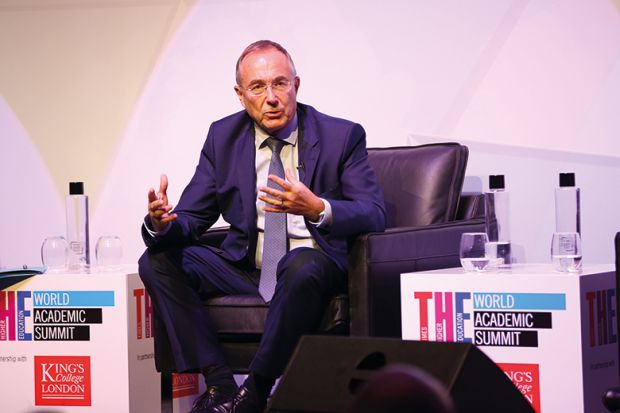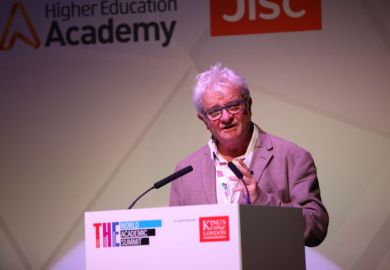Brexit is already having a significant impact on the recruitment of the next generation of talent in UK science, the head of University College London has warned.
Michael Arthur, president and provost of the institution, said that a recent university fellowship scheme that usually gets about a third of its applicants from researchers based in the European Union, got no such applications this year.
Speaking at the Times Higher Education World Academic Summit, Professor Arthur said that the pipeline of PhD and postdoctoral students coming into the UK from the Continent was slowing.
“I have been accused of being a scaremonger about these issues, but what I want to tell you is that it is already happening now, whether our politicians like it or not,” he said. “Brexit, and the discussions around Brexit, and in particular the failure to be clear about the future rights of EU citizens…is already having an impact.”
Professor Arthur said that the life sciences and medical faculties at UCL offer six or seven research excellence fellowships each year, which are usually “highly sought after”. Of the 100 scholars who typically apply, about 30 per cent are based at EU institutions, he added.
“When we ran that programme this year we had no applications from people at EU institutions. That really shocked me,” he said. “We have to be very clear that these changes that are going on in our country are already affecting our ability to recruit and retain the very best.”
Professor Arthur, who leads on Brexit issues for the Russell Group, said that the pipeline of new talent that supports excellent research in the UK “might disappear” in a “very slow and eroding way”.
Another of his “deep concerns” over Brexit is that UK universities will lose their top professors to institutions in Europe, which are doing a “low swoop” to lure talent, the event heard.
Frédéric Mion, president of Paris’ Sciences Po, said that Brexit was “bad news” for universities on the Continent, too. He said that it was “essential” that the UK retains access to the European Commission’s research funding programmes.
“The UK has done extremely well at these programmes…and we need the UK to keep thriving in that context,” he said.
The UK’s success raises standards and fosters healthy competition with other countries, Professor Mion explained. “It forces us to be better at the game and that is the only way that we can achieve progress,” he said.
Kurt Deketelaere, secretary general of the League of European Research Universities, said that, in his personal opinion, Brexit was unlikely to happen.
“In more time the whole atmosphere and attitude will change,” he said, adding that universities still had to “plan for the worst”.
But Professor Arthur countered that he had been assured by a senior official in the UK's Department for Exiting the EU that he should have no doubts “Brexit is going to happen”.
Register to continue
Why register?
- Registration is free and only takes a moment
- Once registered, you can read 3 articles a month
- Sign up for our newsletter
Subscribe
Or subscribe for unlimited access to:
- Unlimited access to news, views, insights & reviews
- Digital editions
- Digital access to THE’s university and college rankings analysis
Already registered or a current subscriber?







